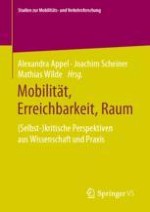2020 | OriginalPaper | Chapter
Multimodality and Sustainable Transport: A Critical Perspective
Authors : Giulio Mattioli, Eva Heinen
Published in: Mobilität, Erreichbarkeit, Raum
Publisher: Springer Fachmedien Wiesbaden
Activate our intelligent search to find suitable subject content or patents.
Select sections of text to find matching patents with Artificial Intelligence. powered by
Select sections of text to find additional relevant content using AI-assisted search. powered by
